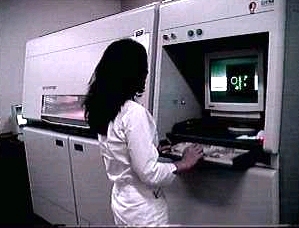Li Qiang (revolutionary)
| |||||||||||||||||||||||||||||||||||
Read other articles:

Artikel ini bukan mengenai Rel ketiga atau Rel paksa. Artikel atau sebagian dari artikel ini mungkin diterjemahkan dari Dual gauge di en.wikipedia.org. Isinya masih belum akurat, karena bagian yang diterjemahkan masih perlu diperhalus dan disempurnakan. Jika Anda menguasai bahasa aslinya, harap pertimbangkan untuk menelusuri referensinya dan menyempurnakan terjemahan ini. Anda juga dapat ikut bergotong royong pada ProyekWiki Perbaikan Terjemahan. (Pesan ini dapat dihapus jika terjemahan diras...

DamYali Falls DamLocation of Yali Falls Dam in VietnamCountryVietnamCoordinates14°13′37″N 107°49′44″E / 14.227°N 107.829°E / 14.227; 107.829Construction began1993Opening date1996Dam and spillwaysImpoundsKrong PokoHeight69 m (226 ft)ReservoirSurface area64.5 km2 (24.9 sq mi)Installed capacity720 MW The Yali Falls Dam is the second largest dam in Vietnam, located in Gia Lai and Kon Tum provinces on the Krong P...

French musician (1879–1941) Philippe Gaubert (c. 1920) Philippe Gaubert (5 July 1879 – 8 July 1941) was a French musician who was a distinguished performer on the flute, a respected conductor and a composer, primarily for the flute.[1] Biography Gaubert – commonly referred to as Gauberto – was born in Cahors but moved to Paris with his parents when he was six. His mother, who worked as a housekeeper, occasionally cleaned the apartment of Paul Taffanel, who began teaching Phili...

Російсько-перська війна: Московсько-перський конфлікт (1651—1653) — збройний конфлікт на Північному Кавказі, пов'язаний з намірами Персії зміцнитися в регіоні. Перський похід Петра І — похід російської армії та флоту в Північний Азербайджан та Дагестан, що належали Пер

Lage der höchsten Hauptgipfel Die Liste der höchsten Berge in Deutschland führt die Berge mit den höchsten Gipfeln Deutschlands auf. Alle diese Berge befinden sich im südlichsten Bayern nahe der Grenze zu Österreich. Innerhalb der Alpen liegen sie in den Ostalpen und sind Teil der Nördlichen Kalkalpen. Zum größten Teil gehören sie den Gebirgsgruppen Wetterstein, Berchtesgadener Alpen und Allgäuer Alpen an. Da die Definition eines Berges nicht allgemeingültig festgelegt ist, wird z...

Artikel ini sebatang kara, artinya tidak ada artikel lain yang memiliki pranala balik ke halaman ini.Bantulah menambah pranala ke artikel ini dari artikel yang berhubungan atau coba peralatan pencari pranala.Tag ini diberikan pada November 2022. Dilek Kolat Dilek Kolat (née Demirel, lahir 7 Februari 1967) adalah seorang politikus Turki-Jerman dan anggota Partai Sosial Demokrat. Ia menjabat sebagai Menteri Negara Bagian untuk Kesehatan, Perawatan dan Kesetaraan dalam pemerintahan walikota Mic...

كميل أرامبورغ (بالفرنسية: Camille Arambourg) معلومات شخصية اسم الولادة (بالفرنسية: Louis Joseph Camille Arambourg)[1][2] الميلاد 3 فبراير 1885[3] الدائرة التاسعة في باريس[3] الوفاة 19 نوفمبر 1969 (84 سنة) [2] الدائرة العاشرة في باريس[2] الإقامة الدائرة الخام�...

Artikel ini tidak memiliki bagian pembuka yang sesuai dengan standar Wikipedia. Mohon tulis paragraf pembuka yang informatif sehingga pembaca dapat memahami maksud dari Daftar anggota Kongres Amerika Serikat yang dibunuh atau dilukai saat menjabat. Contoh paragraf pembuka Daftar anggota Kongres Amerika Serikat yang dibunuh atau dilukai saat menjabat adalah .... (Pelajari cara dan kapan saatnya untuk menghapus pesan templat ini) Daftar Dibunuh Anggota Partai Tanggal Ref. Foto Nama Henry Wharto...

John EscreetBackground informationBorn (1984-08-18) 18 August 1984 (age 39)Doncaster, EnglandGenresJazz, electronic, avant-gardeOccupation(s)MusicianInstrument(s)Piano, keyboardsYears active2000s–presentLabelsPosi-Tone, Mythology, Criss Cross, Whirlwind, Sunnyside, BRMWebsitewww.johnescreet.comMusical artist John Escreet (born 18 August 1984) is an English pianist, composer and improviser. He has lived in the United States since 2006 and currently resides in Los Angeles, California. Bi...

Hamlet in Somerset, England Blatchbridge Blatchbridge is a hamlet within the civil parish of Selwood in Somerset, England, on the B3092 road from Frome to Maiden Bradley. It formerly had a blacksmith's shop, on the Frome side of the River Frome. It has a public house called the Cross Keys, which was built in the early 19th century and has been designated as a Grade II listed building.[1] A former Methodist chapel, now converted to a private dwelling, is halfway up the hill towards Fro...

Indian politician Not to be confused with Abdus Sattar (president). For disambiguation, see Abdus Sattar. Abdus Sattar is a politician in West Bengal, India, belonging to the Indian National Congress. He was a former Communist Party of India (Marxist) Politician. After the 2006 West Bengal state assembly election (in which he was elected MLA from the Amdanga constituency) he became Minister of State for Minorities Development, Welfare and Madrasah Education in the Left Front Ministry.[1&#...

Secure lockable box used for securing valuable objects For other uses, see Safe (disambiguation). This article needs additional citations for verification. Please help improve this article by adding citations to reliable sources. Unsourced material may be challenged and removed.Find sources: Safe – news · newspapers · books · scholar · JSTOR (June 2013) (Learn how and when to remove this template message) A typical home safe, which is portable. This ty...

Nữ anh hùng hư cấu của John Greenleaf Whittier Maud Muller nhìn chằm chằm vào mông lung, hối tiếc vì đã không hành động và suy nghĩ về những gì có thể đã xảy ra. Các cung bậc củaCảm xúc Ở động vật Trí tuệ xúc cảm Tâm trạng Các cảm xúc Bất an Buồn Chán Cô đơn Đam mê Đau khổ Đồng cảm Ganh tị Ghen tuông Ghê tởm Hạnh phúc Hối hận Hối tiếc Hy vọng Khinh thường Khó chịu Khoái lạc Lãnh...

Son of U.S. president John F. Kennedy Patrick Bouvier KennedyGravestone at the Kennedy family plot in Arlington National CemeteryBorn(1963-08-07)August 7, 1963Otis Air Force Base Hospital, Bourne, Massachusetts, United StatesDied(1963-08-09)August 9, 1963 (aged 2 days)[1]Boston Children's Hospital, Boston, Massachusetts, United StatesCause of deathHyaline membrane diseaseResting placeArlington National CemeteryParents John F. Kennedy Jacqueline Kennedy RelativesSee Kennedy f...

North Carolina-based indie rock group Museum MouthBackground informationOriginSouthport, North CarolinaGenresIndie rock, noise popYears active2009–presentLabelsTiny Engines, Equal Vision, RoryMembersKarl Kuehn, Kory Urban, Morgan RobertsPast membersSavannah Levin, Graham HighWebsitehttp://www.museummouth.com/ Museum Mouth is a band that originated in Southport, North Carolina in 2009. It consists of three members: Karl Kuehn who also played in the band Family Bike[1] (drums, vocals)...

آلة النماذج الأولية السريعة التي تستخدم تلبيد الليزر الانتقائي نموذج تشريح ثلاثي الأبعاد هذه المقالة بحاجة لمراجعة خبير مختص في مجالها. يرجى من المختصين في مجالها مراجعتها وتطويرها. النماذج الأولية السريعة هي مجموعة من التقنيات التي تستخدم بشكل سريع لصناعة نموذج مصغر من ...

Australian government department, 1901–1975 This article is about the use in Australia. For the general use, see Postmaster General. Postmaster-General's DepartmentDepartment overviewFormed1 January 1901[1]Dissolved22 December 1975[1]Superseding agencyPostal and Telecommunications DepartmentJurisdictionCommonwealth of Australia Manual telephone, c. 1950. The phone and lines remained the property of the PMG. The Postmaster-General's Department (PMG) was a department of the Au...

This article is about an American street performer from Seattle. For other uses, see Artis (disambiguation). Artis the SpoonmanArtis (left) performing with Jim Page at Seattle's University District Street Fair (1993)Background informationBorn (1948-10-03) October 3, 1948 (age 75)Kodiak, Alaska TerritoryOriginSeattle, Washington, USAGenresRockOccupation(s)Musician, entertainerYears active1972–presentLabelsSapphireWebsiteartisthespoonman.netMusical artist Artis, known professionally as A...

Italian Marxist–Leninist terrorist group Front LinePrima LineaLeadersRoberto SandaloMarco Donat-CattinMichele ViscardiEnrico GalmozziFabrizio GiaiSergio SegioSusanna RonconiDiego ForastieriRoberto RossoMaurice BignamiBruno La RongaGiulia BorelliSilviera RussoDates of operation1976–1983Active regionsItalyIdeologyCommunismMarxism–LeninismMajor actionsMurder, kidnapping, conspiracy, terrorism Part of a series onTerrorism Definitions History Incidents By ideology Anarchist Communist Le...

Dutch basketball player and coach Ton BootBoot in 1984Personal informationBorn (1940-10-16) October 16, 1940 (age 83)Amsterdam, NetherlandsNationalityDutchListed height1.86 m (6 ft 1 in)Career informationPlaying career1958–1970Coaching career1978–2007Career historyAs player:1958–1961DED1961–1965The Wolves Amsterdam1965–1970Blue StarsAs coach:1978–1980EBBC Den Bosch1980–1981Parker Leiden1982–1985EBBC Den Bosch1985–1993Den Helder1994–1997Oostende1998–20...
